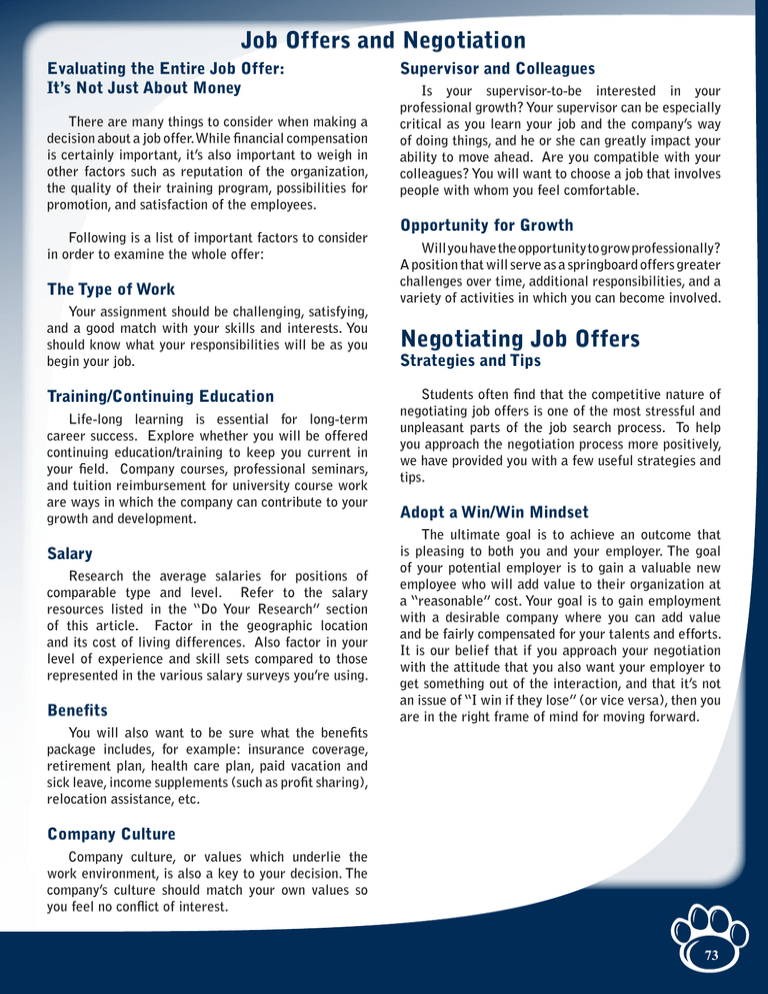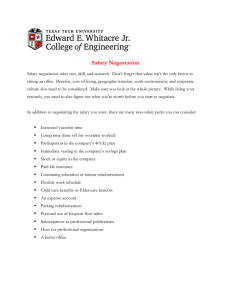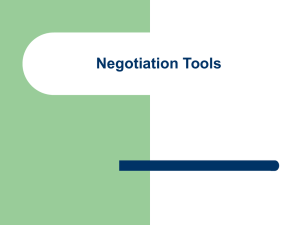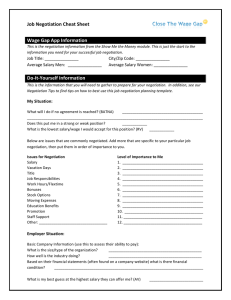Job Offers and Negotiation Evaluating the Entire Job Offer: Supervisor and Colleagues
advertisement

Job Offers and Negotiation Evaluating the Entire Job Offer: It’s Not Just About Money There are many things to consider when making a decision about a job offer. While financial compensation is certainly important, it’s also important to weigh in other factors such as repu­tation of the organization, the quality of their training program, possibilities for promotion, and satisfaction of the employees. Following is a list of important factors to consider in order to examine the whole offer: The Type of Work Your assignment should be challenging, satisfying, and a good match with your skills and interests. You should know what your responsibilities will be as you begin your job. Training/Continuing Education Life-long learning is essential for long-term career success. Explore whether you will be offered continuing educa­tion/training to keep you current in your field. Company courses, professional seminars, and tuition reimbursement for university course work are ways in which the company can contribute to your growth and development. Salary Research the average salaries for positions of comparable type and level. Refer to the salary resources listed in the “Do Your Research” section of this article. Factor in the geographic location and its cost of living differences. Also factor in your level of experience and skill sets compared to those represented in the various salary surveys you’re using. Benefits You will also want to be sure what the benefits package includes, for example: insurance coverage, retirement plan, health care plan, paid vacation and sick leave, income supplements (such as profit sharing), relocation assistance, etc. Supervisor and Colleagues Is your supervisor-to-be interested in your professional growth? Your supervisor can be especially critical as you learn your job and the company’s way of doing things, and he or she can greatly impact your ability to move ahead. Are you compatible with your colleagues? You will want to choose a job that involves people with whom you feel comfortable. Opportunity for Growth Will you have the opportunity to grow professionally? A position that will serve as a springboard offers greater challenges over time, additional respon­sibilities, and a variety of activities in which you can become involved. Negotiating Job Offers Strategies and Tips Students often find that the competitive nature of negotiating job offers is one of the most stressful and unpleasant parts of the job search process. To help you approach the negotiation process more positively, we have provided you with a few useful strategies and tips. Adopt a Win/Win Mindset The ultimate goal is to achieve an outcome that is pleasing to both you and your employer. The goal of your potential employer is to gain a valuable new employee who will add value to their organization at a “reasonable” cost. Your goal is to gain employment with a desirable company where you can add value and be fairly compensated for your talents and efforts. It is our belief that if you approach your negotia­tion with the attitude that you also want your employer to get something out of the inter­action, and that it’s not an issue of “I win if they lose” (or vice versa), then you are in the right frame of mind for moving forward. Company Culture Company culture, or values which underlie the work environment, is also a key to your decision. The company’s culture should match your own values so you feel no conflict of interest. 73 Negotiation Is Not a Bad Word Do Your Research Life is about compromise and negotia­ tion. You do it unconsciously every time you bargain with your friends about whether to go out for pizza or burgers, go to the pool or to the pool hall. In most cases, employers expect some degree of negotiation. It’s the manner in which you negotiate that can make the difference between a positive and negative negotiation experience. As with any interaction, be respectful, understand that you may have to give a little to get a little (remember win/win), and always express appreciation that you have received an offer. You stand a better chance of having a successful salary negotiation if you present a well-reasoned argument that is backed up by data, such as average salary, adjust­ments due to geography and your level of education, background and skills. For example, according to Salary.com, you would need a salary of $78,000 to secure the same lifestyle in Washington, D.C. as $48,000 would get you in Pittsburgh, PA. Timing Is Key The time for negotia­tion occurs at the point that you have been extended an offer of employment, no sooner. This may seem like common knowl­edge, but people still make the mistake of talking money and benefits too soon in the process. Prior to an offer, the focus should be on explaining how you can add value to their organiza­tion and on obtaining information about the specifics of the actual job and the organization. The company should get the impression that your primary focus is on your investment in their organiza­tion...the money will follow. Practice, Practice The art of negotiation like so many aspects of communication and interper­ sonal effectiveness requires practice and experience to be really good at it. In the same way that you might prepare for a job interview, we urge you to put similar effort into your negotiation prep­aration. Career Counselors can help you with preparing a negotiation strategy, answer your specific negotia­tion questions, as well as help you role play a mock negotiation scenario. Resources for Researching Salary A Comprehensive Site for Researching Salary Information salary.com NACE Salary Calculator www.jobsearchintelligence.com/NACE Wage, Earnings and Benefit Data from the U.S. Department of Labor/Bureau of Labor Statistics www.bls.gov/oes Company salaries, reviews, and inside connections for thousands of companies www.glassdoor.com/ Penn State Post Graduation Data studentaffairs.psu.edu/career/postgrad.shtml 74 Understanding the Ethics of Offers • You may receive several offers during your job search. You aren’t required to accept the first job offer that comes along and can continue to interview and consider all of your job offers until you have accepted a job. But once you have accepted a job offer, verbally or in writing, you are bound by ethical standards and values, and remember that you are representing Penn State to the outside world of employers. Employers are also bound by ethical standards. They should: Remember that You’re Representing Penn State Once you accept a job, you should: • Withdraw from the recruiting process. You have made a commitment when you accept an offer. The employer stops interviewing and holds the posi­ tion for you. Accepting an offer as a precautionary measure, hoping that something better will come along, is not only misleading to the employer, but also limits the opportunities for other students who are genuinely interested in that employer. Also, you may change your mind and want to work for that company someday. • Let all employers who are actively considering you know that you are no longer available and that they should consider other candidates. • Notify Career Services so that we will not refer your resume to any other employers. Cancel all pending interviews. If you face extreme circumstances that force you to renege on an acceptance (e.g., critically ill parent, marriage), you should notify your employer immediately and withdraw the accep-­ tance. If you have accepted a signing bonus, you should return it. • Provide accurate information about their organization, positions, career advancement opportunities, and benefits, as well as timely information on your status in the hiring process and any hiring decisions. • Not exert undue pressure. Employers are expected to provide candidates with a reasonable amount of time to make a decision about an offer as well as a reasonable process for making a decision. • Offer fair and equitable assistance, including (but not limited to) financial assistance and outplacement services, if, because of changing conditions (e.g., downsizing, or withdrawn contracts), an employer must revoke a job offer that you have accepted. If you have questions about any aspect of the job search process, including evaluating offers and ethical standards, talk with a Drop-In Counselor in the Bank of America Career Services Center, available 8:30 a.m. to 4:30 p.m. weekdays or until 6:30 p.m. on Tuesdays during the fall and spring semesters. Rank the following in order to help you compare job offers. Repeat this exercise for each job offer you are considering and compare the totals. Factors to consider Column 1 Column 2 Column 3 How Important It Is to You (1 not at all, 2 somewhat, 3 very much) Job Offer 1 (1 doesn’t meet this need, 2 meets this need, 3 exceeds this need) Multiply Column 1 by Column 2 Type of Work Continuing Education Salary Benefits Company Culture Supervision Opportunity for Growth TOTAL (add column 3) 77







